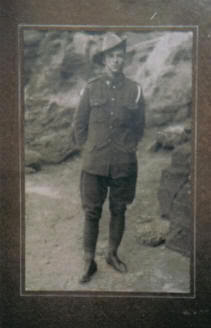Alexander Hiltunen
| Alias | Hiltunin |
|---|---|
| Russian spelling | Александр Хилтунен |
| Born | 6.04.1890 |
| Place | St Petersburg (Church records)* or Vyborg, Finland (now Russia) (naturalisation) |
| Ethnic origin | Finnish |
| Religion | Lutheran |
| Father | Johan Hiltunen* |
| Mother | Johanna Saastamoinen* |
| Contacts | Arrived at Australia together with Bernard Turkulain |
| Arrived at Australia |
from Russia on 15.10.1910 per Sopernik disembarked at Port Adelaide, SA |
| Residence before enlistment | Port Elliot, Gawler, Freeling, SA |
| Occupation | Fireman |
| Naturalisation | 1913 |
| Residence after the war | Port Elliot, SA |
| Died | 18.01.1917, Port Elliot |
Service #1
| Service number | 652 |
|---|---|
| Enlisted | 2.09.1914 |
| Place of enlistment | Morphettville, SA |
| Unit | 12th Battalion |
| Rank | Private |
| Place | Gallipoli, 1915 |
| Casualties | WIA 1915 |
| Final fate | RTA 7.11.1915 |
| Discharged | 3.05.1916 MU |
Materials
Digitised naturalisation (NAA)
Digitised service records (NAA)
Digitised Embarkation roll entry (AWM)
Army pay file (NAA)
*/ Information from Jukka Illman's research
Blog article
Newspaper articles
From Middleton. - The Register, Adelaide, 19 September 1914, p. 9.
Middleton. - Southern Argus, 24 September 1914, p. 3.
The late Private A. Hiltunen. - The Advertiser, Adelaide, 9 January 1917, p. 8.
Late Private A. Hiltunen. - The Register, Adelaide, 9 January 1917, p. 5, portrait.
Port Elliot. - Southern Argus, 11 January 1917, p. 3.
The late Private A. Hiltunen. - Chronicle, Adelaide, 13 January 1917, p. 45.
A soldier's monument. - The Register, Adelaide, 7 July 1917, p. 8.
The late Private Hiltunen. - The Advertiser, Adelaide, 3 July 1917, p. 6.
From Russian Anzacs in Australian History:
The story of Alexander Hiltunen, a Finnish youth from a well-placed Vyborg family, who arrived as a sailor at Port Adelaide in 1910, must have been typical for many seamen. Hiltunen left his ship and went to Port Elliot, according to his obituary: 'He was unable to speak the English tongue but by making signs to Mrs Trigg of Cliff House conveyed the fact that he was hungry. He seemed young and fresh and the good lady's heart went out to him with the result she treated him as a son, teaching him the English tongue and giving him some experience at a trade.'
The kindly Mrs Trigg brings to mind Basil Greshner's 'old lady' from Winchelsea -- there must have been many who, unsung, opened their hearts to these strangers. The effect of such kindness can be far-reaching; when war broke out Hiltunen felt impelled to repay the debt, but his was a short, tragic life [...].
The very first contingent [...] -- this First Fleet of the new Australian nationhood -- left Australian waters in early November 1914 with at least 12 Russians: the Finns Baer and Hiltunen, the ethnic Russians Arn, Kamishansky, Sast and Sindeeff, the Polish-born Markowicz and Watson, the Jews Zander and Levene, and the Russian-born Englishmen Ball and Dyson.
Gallery

Alexander Hiltunen
Courtesy of Lorraine Pomery
 Russian Anzacs
Russian Anzacs